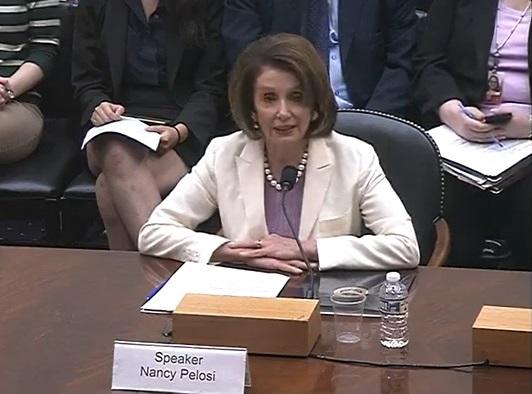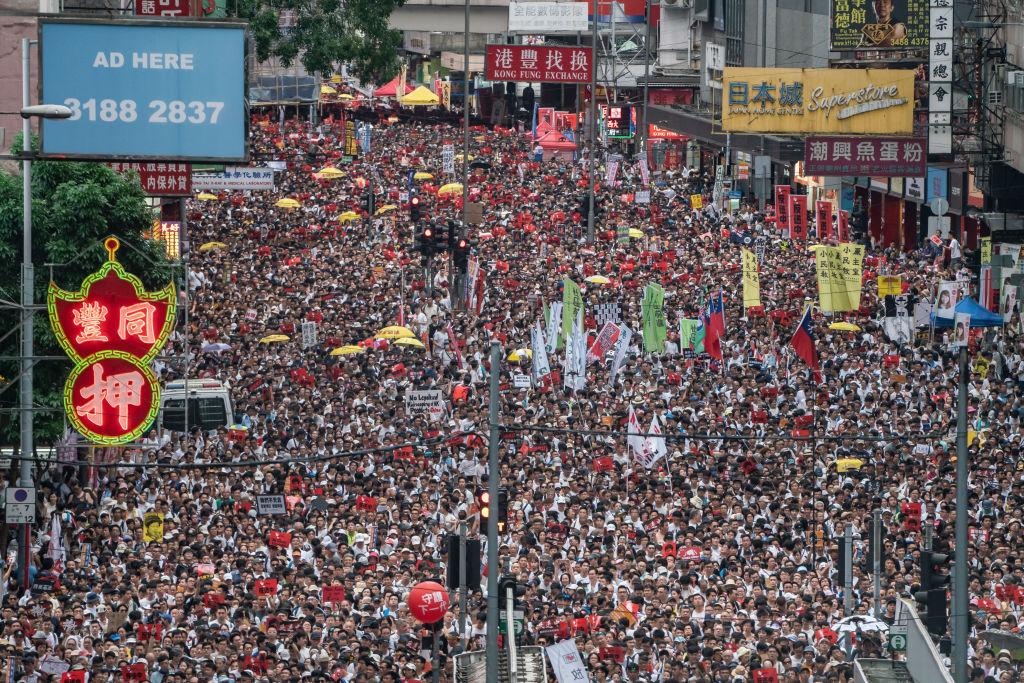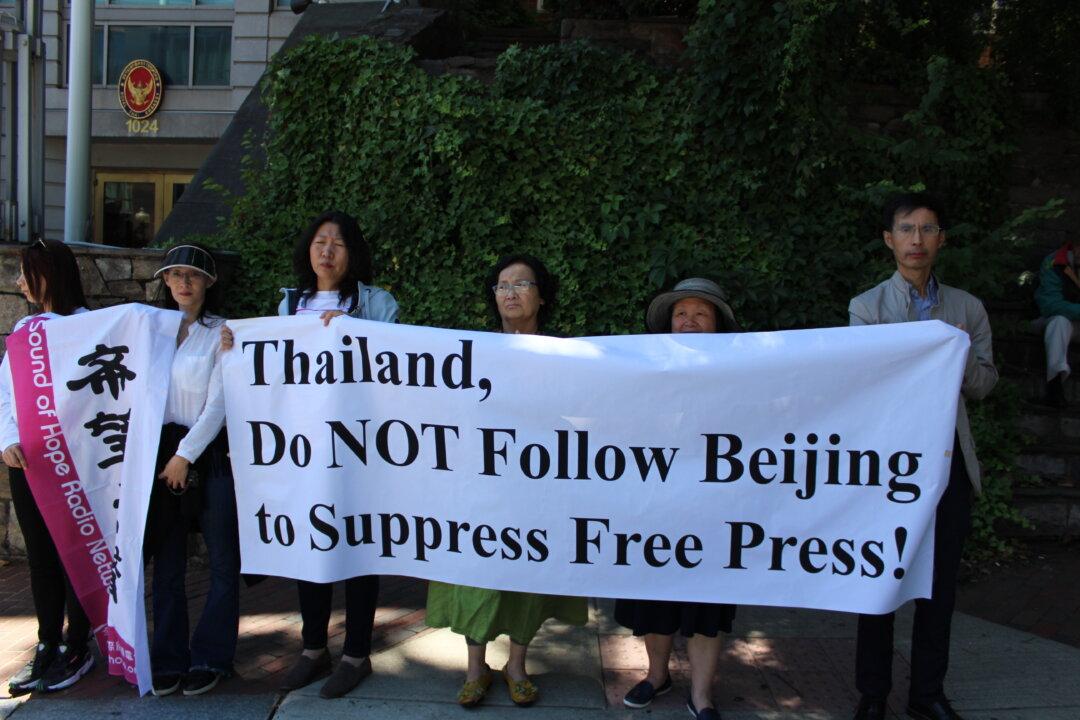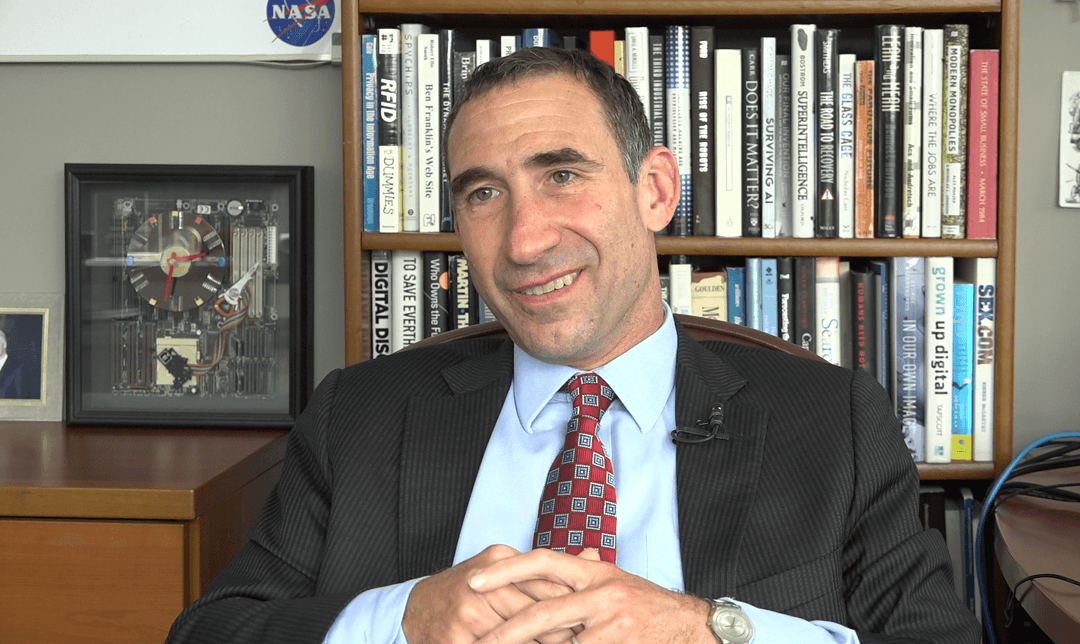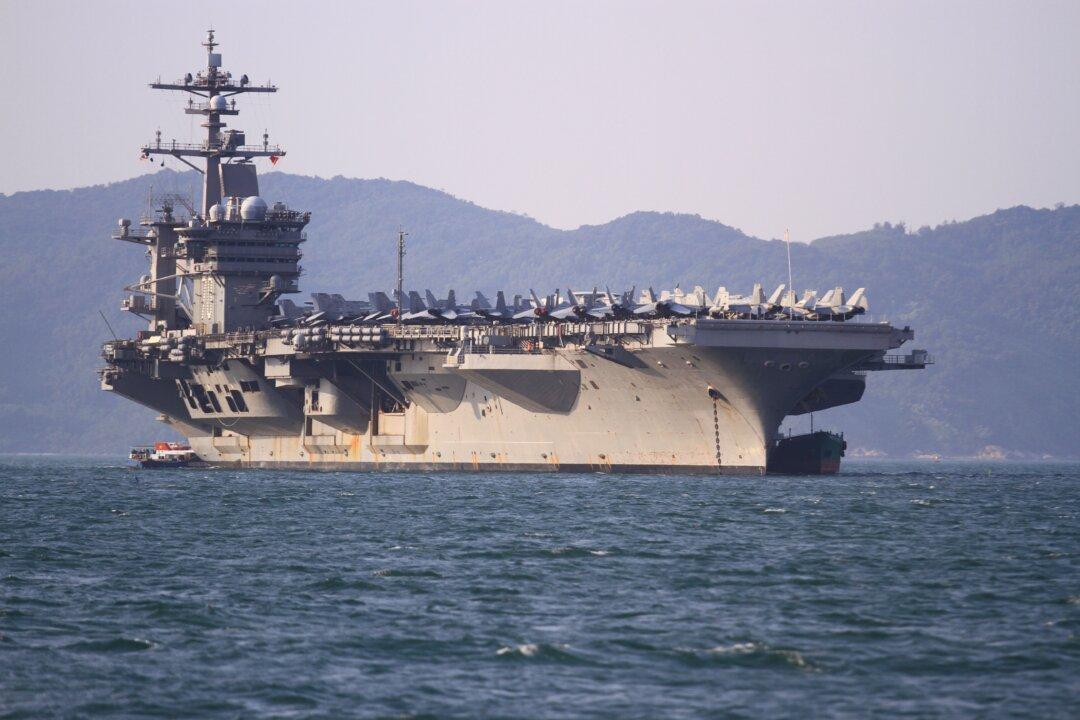WASHINGTON—While the Chinese Communist Party (CCP) has been trying to erase the history of the 1989 Tiananmen Square protest and massacre, U.S. House Speaker Nancy Pelosi said at a Congressional hearing, the peaceful protesters’ names “are remembered and their sacrifices are recognized. Their sacrifice is not just for them personally but sacrifice for democracy throughout the world.”
The Congressional-Executive Commission on China (CECC) and the Tom Lantos Human Rights Commission held a congressional hearing entitled “Tiananmen at 30: Examining the Evolution of Repression in China” on Tuesday, June 4.
Congressman Jim McGovern (D-Mass.), Chair of the hearing, said the Tiananmen Square protests and massacre were a turning point. The Chinese regime turned away from the possibility of democracy to continue on the path of totalitarianism.
McGovern showed the audience a picture of a candlelight vigil at Victoria Square in Hong Kong where tens of thousands of citizens are honoring those who lost their lives in Tiananmen Square and other uprisings across China. The vigil was happening while the hearing was taking place.
June 4 this year marks the 30th Anniversary of the Tiananmen Square protests and massacre in 1989. It refers to the popular national movement inspired by the Beijing protests during that period, sometimes called the ‘89 Democracy Movement.
The protests were forcibly suppressed after the Chinese government declared martial law and sent in the military to occupy central parts of Beijing. It was reported troops with assault rifles and tanks fired at the demonstrators trying to block the military’s advance towards Tiananmen Square. Estimates from human rights groups say the death toll varies from several hundred to several thousand.
Pelosi: Those Who Sacrificed for Democracy in China Will Not Be Forgotten
As a founding member of CECC and a witness sitting among the panelists, Speaker Pelosi (D-Calif.) testified and reviewed her engagement in the event 30 years ago and a few Acts passed by the Congress to protect Chinese students and advocates fighting for democracy in China.“Today we remember the brutal massacre that the Chinese government committed against its own people thirty years ago. We remember the courage of the students, workers and citizens who peacefully defied a repressive regime to demand the democracy and human rights that they deserve.” Pelosi said.
She was sad when she was back in China years later and talked about the event with students in universities, most of them had no idea what it was about. “The Chinese [regime] has totally suppressed what happened in Tiananmen Square as well as the lone man standing before the tank… [While the courage of Chinese protestors] is revered by the whole world, they are unknown to young people in China.”
“We must remember, because China still tries to deny history. As writer Liu Xun wrote ‘lies written in ink cannot disguise facts written in blood.’”
Pelosi said one of the most crucial punishments the Chinese regime gave to its political prisoners is to say “nobody remembers you and why you are here.” But “we want to be sure that those prisoners know: they are not forgotten. In the Congress of United States, their names are remembered and their sacrifices are recognized. Their sacrifice is not just for them personally but a sacrifice for democracy throughout the world.”
On June 21, two weeks after the Tiananmen Massacre, the Congress introduced in a bipartisan way and passed the Emergency Chinese Immigration Relief Act to help Chinese students facing persecution stay in America. Later on, the Chinese Student Protection Act was passed by Congress.
U.S. Congressmen Went to Tiananmen Square to Support the Chinese People
Two years after the massacre, some Democrat and Republican members including Pelosi stood on Tiananmen Square and unfolded a banner reading “To Those Who Died for Democracy in China.” Then they were chased by members of the People’s Liberation Army. Some of the members of Congress were assaulted, and their film was taken away forcefully by the police, Pelosi said.30 years after the Massacre, while the world sees China has changed in its economy, its record of repression has not. Minority groups like Tibetans and Uyghurs, journalists, human rights lawyers, democracy advocates, Christians, Falun Gong practitioners, and other faith groups are denied dignity, justice, and their rights.
“If we don’t speak about human rights in China because of economic concerns, we lose all moral authority to talk about human rights in any other place in the world,” Pelosi said.
She added human rights and trade cannot be separated. “That’s why in 1993, we worked on US-China Act to tie any extension to China’s trade status to improvement of human rights by the Chinese government. In 1994, we urged Congress to limit the Most Favorable Nation status on products made by the People’s Liberation Army, the perpetrator of the massacre on Tiananmen Square.
“The US-China bilateral WTO agreement is seriously deficient in substance, implementation, and enforcement. This issue is too important for our economy to be based on a pattern of broken promises and not proven performance.”
Pelosi said while the U.S. government works on trade agreements with other countries today, the Congress continues to insist that any policy be tied to human rights. “Americans must demonstrate the moral courage to use our leverage to not only guarantee fair trade for our products in Chinese markets but also to advance human rights in China.”
“We cannot allow economic interests in China to blind us to the moral injustices committed by China.”
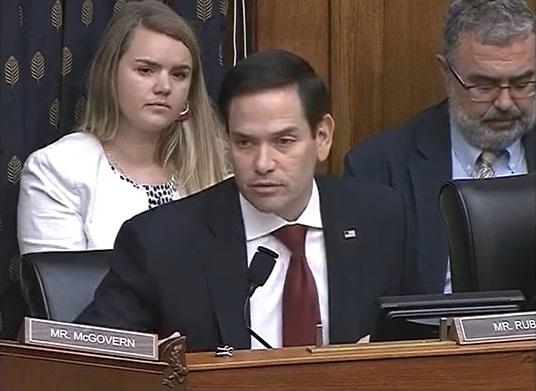
Rubio: the Goal of Chinese Communist Party Has Never Changed
Sen Marco Rubio (R-Fla.), the co-chair of the CECC, said democracy is not limited to one nation, one region, or one culture, but belongs to all human beings.He said the hearing is “honoring the lives that were irrevocably altered by the events of that day: Those who were perished, prisoned, tortured; and those who lost mothers, fathers, sons and daughters; and those whose beloved ones are still missing and unaccounted for.”
“Today we must recognize the ongoing human rights abuses committed by the Chinese Communist Party and government against its own people.
“We must recognize the geopolitical competition between tyranny and liberty, between democracy and totalitarianism.”
Today the exact casualty number is still unknown. There has been no public accounting of the event hat week and no justice for the victims. Instead, people who are commemorating the event or seek information about the event are harassed, detained, or arrested.
“The principles of freedom and democracy and self-rule are not just American principles. They are human principles that neither tank, nor torture, nor terror can erase, not even by the Communist Party of China,” Rubio said.
“The U.S. and nations of the free world should demand the Chinese government allow open discussion on the events of that day and unconditionally release those who are detained for commemorating the anniversary.
“We must continue to use opportunities like this to speak out the true story of the Tiananmen Square Massacre. The event revealed to the world the true nature of the Communist Party in China.”
For decades, Rubio said, the Congressmen wrongly assumed constructive engagement with China would encourage the Chinese regime to embrace and accept liberty and respect for human rights. “Today we see an increasingly aggressive Chinese government that is more repressive in domestic policies, more mercantilistic in trade and economic policy, increasingly dismissive of all international norms, and more assertive in exporting their authoritarian model globally.”
“The goal of the Chinese Communist Party remains exactly the same as it was 30 years ago: to preserve the communist party’s monopoly on domestic power through mass and data driven surveillance, through arbitrary detention, torture, and violence. The Communist Party of China today is using technology to stay in power.
“The surveillance technology the Chinese Communist Party has exported to other countries sounds like science fiction, but it’s happening.”
Rubio said, “We must also keep American companies accountable for their potential complicity in the Chinse government’s censorship and other abuses.”
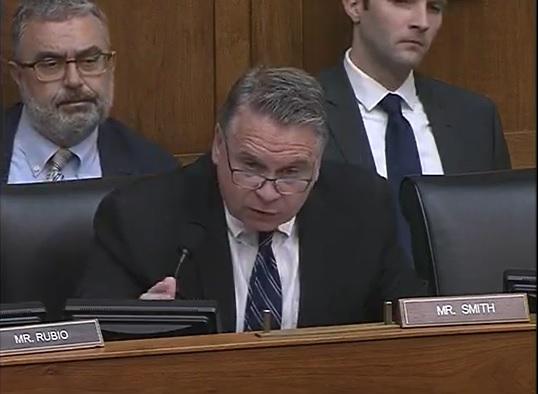
Rep. Smith: There Is No Middle Ground
Representative Chris Smith (R-N.J.), a member of CECC, said the United States should not promote trade with China’s dictatorial government because that would give more money to them to suppress democracy.“You either stand with the Tank Man or with the Tank. There is no middle ground,” he said.
McGovern said while the United States condemns the brutal treatment by the Chinese government against its people, “We highly admire the Chinese people, their culture, and history.”
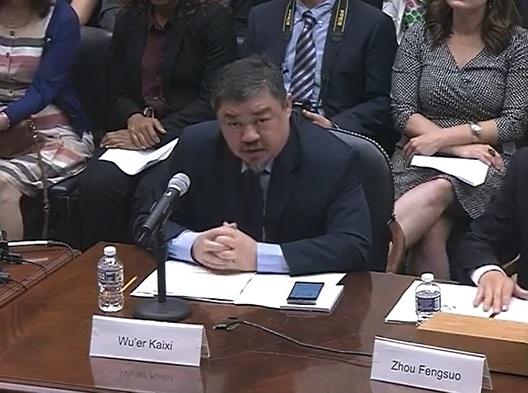
Former Student Leader: Face up to Chinese Government Before It’s Too Strong and Too Late
Wu'er Kaixi, a political commentator and one of the Tiananmen student leaders who later escaped to Hong Kong and lives overseas, gave testimony at the hearing.Kaixi said when he was 21 years old in 1989, marching on the streets of Beijing and occupying Tiananmen Square not only had the support of the Chinese people but also from people all over the world. “Clearly you felt we were fighting for the same thing you had fought for and live by,” he said.
However, Kaixi continued, “history records that this wasn’t the path for China at that time...the Chinese Communist Party sent in tanks and troops to massacre the people...It has continued to rule since then, at the barrel of a gun, using fear and lies.”
“We were betrayed.” Kaixi added, “The support we had didn’t last, and we the Chinese democracy activists were abandoned to our fate. Mentioning Tiananmen became an inconvenience for the leaders of the world’s democracies.”
“Today’s world leaders are not responsible for the mistakes of their predecessors. But if you ignore the lessons of the past and continue to look the other way rather than hold the Communist Party accountable for its crimes, it will be too late to say or do anything about it—and this looks suspiciously like a policy of appeasement.”
He criticized the late President George H.W. Bush who not only took four days before condemning the atrocity but secretly went to Beijing not long after.
“The Cold War, lasting four decades, had ended. The national interest that Dr. Kissinger proudly proclaimed he was protecting had expired. Yet the policy remained and Dr. Kissinger was received as one of Beijing’s greatest friends, and became rich by brokering favored access to the China market for American companies.”
Kaixi said, “I have waited a long time for the United States to realize there is something fundamentally wrong with this picture. Perhaps it is only now that a businessman-president finally sees it?”
“Democracy is not a religion or a set of standards, it’s a practice, a dynamic process, constantly refined and improved.”
Pompeo Urges China to Release All Prisoners of Conscience
On Monday, in a statement that complemented the testimony given at the CECC hearing, U.S. Secretary of State Mike Pompeo called on Beijing to release all prisoners jailed for fighting for human rights or voicing different political views in China.“Such a step would begin to demonstrate the Communist Party’s willingness to respect human rights and fundamental freedoms,” said Pompeo in his statement.
“We call on China to release all those held for seeking to exercise these rights and freedoms, halt the use of arbitrary detention, and reverse counterproductive policies that conflate terrorism with religious and political expression,” he noted.
Pompeo also urged China to make a full public account of people killed or missing in the crackdown at Tiananmen Square in 1989.
He said China’s human rights record has not improved despite its gains on the international stage. He condemned the treatment of the country’s minority groups and faith groups.
“China’s one-party state tolerates no dissent and abuses human rights whenever it serves its interests,” said Pompeo. “Today, Chinese citizens have been subjected to a new wave of abuses.”
